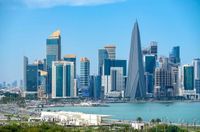DOHA: Qatar is increasingly recognized as a global investment hub, strategically positioned between East and West, and backed by a government committed to economic diversification, innovation, and international appeal. Speaking to The Peninsula, Serban Spirea, CEO of FG Realty, emphasized that "with world-class infrastructure, a stable economy, and high-profile global events such as the FIFA World Cup 2022, Qatar continues to cement its position as a premier destination for investors." This sentiment is echoed in a recent report by the global data platform, Statista, which projects Qatar’s commercial real estate market to reach a staggering value of $209.94 billion.
Experts anticipate that by 2029, the market will further expand to $213.48 billion, with a steady annual growth rate of 0.42 percent, underscoring Qatar’s consistent progress and the stability of its real estate sector. The economic boom in Qatar is largely attributed to the government’s commitment to diversifying the economy, reducing its reliance on oil revenues, and expanding infrastructure projects. From state-of-the-art skyscrapers to commercial spaces that blend modernity with cultural heritage, Qatar’s real estate market offers a dynamic range of opportunities for investors.
Moreover, the country’s favorable policies, tax advantages, and robust legal frameworks have made it an increasingly attractive destination for foreign investors. Spirea noted that foreign investment in Qatar is not merely a trend but a growing cornerstone of the country’s economy. By the end of the year, foreign investors will find a smooth pathway for entry, thanks to relaxed ownership laws, strategic economic zones, and a wealth of opportunities in high-end commercial properties.
In contrast, the more competitive and saturated real estate markets in countries like the United States, which is set to reach an extraordinary $25.8 trillion in real estate value this year, highlight Qatar’s unique position. Qatar’s smaller yet rapidly expanding market offers a wealth of untapped potential, making it an enticing alternative for investors seeking growth opportunities in the Middle East.
The outlook for Qatar’s commercial real estate sector in 2025 is further bolstered by major developments such as the expansion of the Doha metro, the construction of new financial districts, and an influx of international businesses. Qatar's strategic 2030 vision aims to transform the country into a global business and tourism hub, which will continue to attract high-caliber investments in commercial properties.
Spirea stated that by the year-end, Qatar will not only be one of the leading commercial real estate markets in the region but also a compelling choice for foreign investors seeking both stability and growth. He added, "If Qatar develops and retains the best real estate agents, it will solidify its position as a premier real estate investment destination in the region." This highlights the crucial role that real estate professionals play in enhancing the country’s global investment appeal.
Spirea further suggested that by implementing a structured approach to training, incentivizing, and elevating real estate professionals, Qatar can attract more foreign investors, boost its economy, and maintain its competitive edge on the global stage. As the real estate sector continues to thrive, the importance of skilled agents cannot be overstated.
In the financial sector, Qatar National Bank (QNB) has emerged as a leader, winning the Best Private Bank award in Qatar for 2025. With a market share exceeding 30%, QNB has significantly enhanced its investment opportunities and digital banking solutions. Dedicated private bankers are available 24/7 to clients, ensuring efficient management of their multi-currency accounts, deposits, loans, e-banking, and investments.
QNB has developed a leading platform where clients can invest in equity, fixed-income, structured products, real estate, and commodities. These investments can be tailored into portfolios that create value-adding solutions based on the client’s risk profile. Furthermore, clients can trade local, regional, and international stocks and bonds, benefiting from the bank’s world-class research and analysis.
In the digital arena, QNB has expanded its self-service channels, introducing a new chatbot feature that assists clients with various services, such as viewing their balance, managing their cards, paying bills, and transferring funds. This innovation reflects the bank’s commitment to providing seamless banking experiences in an increasingly digital world.
On the stock market front, the Qatar Stock Exchange (QSE) index closed the week ending on March 28, 2025, down 1.070 points, losing a total of 110.730 points to stand at 10,232 points. The real estate sector recorded the largest losses, at 3.760 percent, while the transportation sector achieved the largest gains, at 0.71 percent. Financial markets analyst Youssef Bouhlaika told Qatar News Agency (QNA) that the QSE, like other regional markets, witnessed mixed performance during the week preceding the Eid Al Fitr holiday, with a negative outlook due to ongoing pressures from the trade war between the United States and several other countries.
Bouhlaika pointed out that these conditions led to a decline in trading values in the Qatari market, where selling operations dominated compared to buying. The average trading value during the week reached approximately QR 316.6 million. However, he also noted attractive investment opportunities offered by the QSE, supported by strong economic fundamentals and diverse initiatives. Notably, the first liquefied natural gas (LNG) production line is set to commence in 2026, which is expected to provide new momentum to trading.
Following the Eid holiday, the QSE will announce the results of companies listed on the exchange, which could further invigorate market activity. Bouhlaika commended the performance of QSE-listed companies, which achieved profits amounting to QR 51.18 billion by the end of 2024, reflecting an increase of approximately 8.70 percent compared to 2023. This highlights the resilience and growth potential of Qatar's financial landscape.





